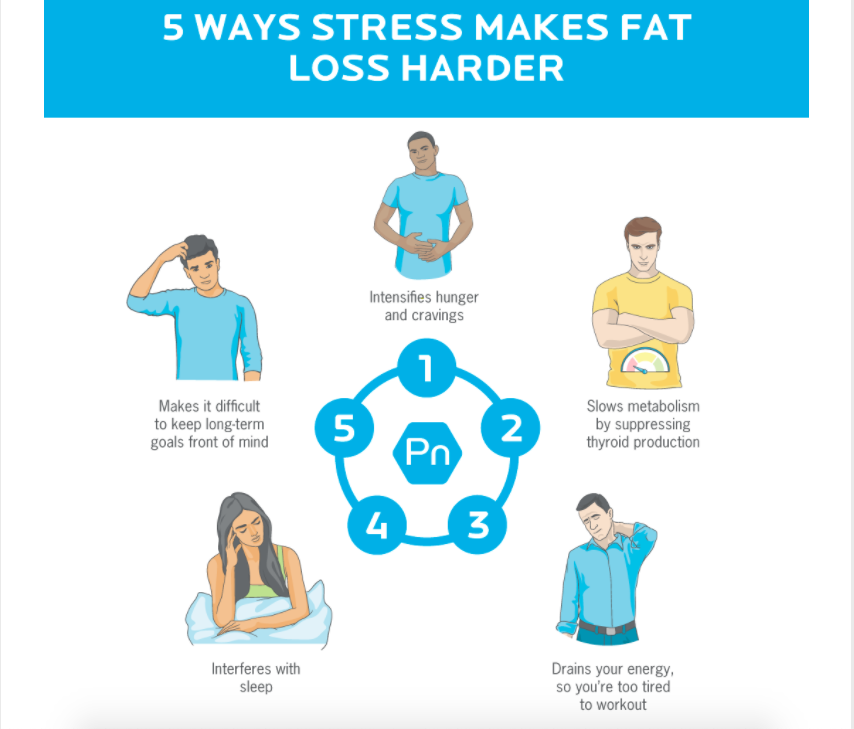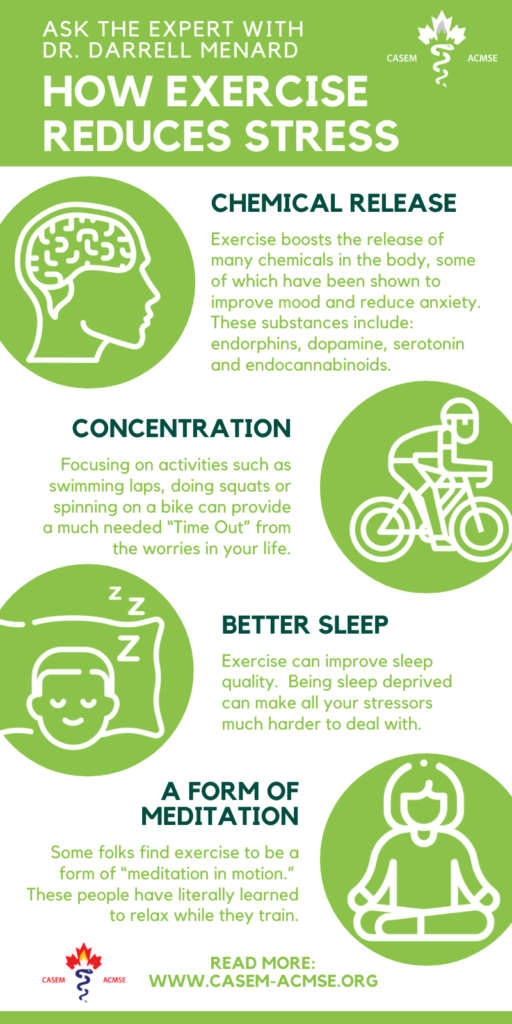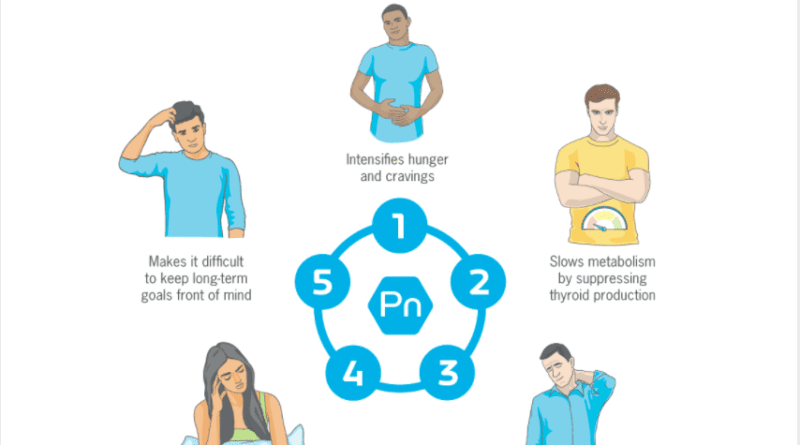Why Exercise Is Essential In Managing Stress-Related Weight Gain
Do you ever notice that when you’re stressed, you start craving all the wrong kinds of food? I know I certainly do. So, what’s the deal with stress-related weight gain and how can exercise help manage it? In this article, we’ll dive into the connection between stress and weight gain, and why exercise is essential in keeping those extra pounds off.
When you’re under stress, your body releases a hormone called cortisol, also known as the “stress hormone”. This hormone signals your body to store fat, particularly in the abdominal area. It’s not just a coincidence that we often reach for comfort foods when we’re feeling overwhelmed – they temporarily boost our mood by increasing the production of serotonin, a feel-good neurotransmitter. However, these foods tend to be high in sugar, unhealthy fats, and calories, which can lead to weight gain over time.
So, how can exercise help in managing stress-related weight gain? Well, for starters, physical activity helps the body to release endorphins, which are natural mood boosters. This can counteract the negative effects of stress and reduce the likelihood of turning to food for comfort. Additionally, exercise can help lower cortisol levels in the body, making it less likely for excess fat to be stored around the midsection. In fact, research has shown that regular exercise can help regulate the body’s stress response, making it easier to maintain a healthy weight. So, if you’re looking to manage stress-related weight gain, staying active is key. Stay tuned to learn more about the specific types of exercises that can be beneficial in combatting stress-related weight gain.

The Impact of Stress on Weight Gain
Understanding the Connection Between Stress and Weight Gain
Stress and weight gain often go hand in hand, and it’s important to understand the connection between the two. When you’re under chronic stress, your body releases a hormone called cortisol, which can have a significant impact on your weight. Cortisol is known as the “stress hormone” because it is released in response to stress and helps regulate various bodily functions, including metabolism and appetite.
The Role of Cortisol in Weight Gain
Cortisol plays a crucial role in weight gain because it promotes the storage of fat, particularly in the abdomen area. This is commonly referred to as “belly fat” or visceral fat. When cortisol levels are elevated due to chronic stress, it can lead to an increase in appetite and cravings for sugary and high-fat foods. These unhealthy eating habits, coupled with the body’s tendency to store more fat, can contribute to weight gain over time.
Effects of Stress on Eating Habits
Stress can also have a direct impact on our eating habits. Many people turn to food as a way to cope with stress and emotions. This is often referred to as emotional eating or stress eating. During periods of stress, we may seek comfort in foods that are high in calories and provide temporary pleasure. Unfortunately, these high-calorie foods are usually low in nutritional value, leading to weight gain and poor overall health.
Exercise as a Stress Management Tool
The Benefits of Exercise for Stress Relief
Exercise is a powerful tool for managing stress and its negative effects on the body. When you engage in physical activity, your body releases endorphins, which are natural chemicals that help improve mood and reduce stress levels. Regular exercise has been shown to decrease symptoms of anxiety and depression and improve overall mental well-being.
How Exercise Helps Reduce Stress Hormones
In addition to increasing endorphin levels, exercise also helps reduce cortisol levels, the stress hormone responsible for weight gain. Physical activity has been shown to decrease cortisol levels in the body, helping to mitigate the negative effects of chronic stress on weight management. By incorporating exercise into your routine, you can effectively lower cortisol levels and promote a healthier body composition.
Exercise as an Outlet for Emotional Release
Exercise can also serve as a valuable outlet for emotional release. When you’re feeling stressed or overwhelmed, engaging in physical activity can provide a healthy way to channel your emotions. Whether it’s going for a run, practicing yoga, or hitting the gym, exercise allows you to release tension and pent-up emotions, helping to reduce stress levels and improve overall well-being.

Physical Activity and Weight Management
The Role of Exercise in Weight Loss
When it comes to weight loss, exercise is a crucial component. Regular physical activity helps burn calories and build muscle, both of which are important for achieving and maintaining a healthy weight. Exercise increases your metabolism, allowing your body to burn more calories throughout the day, even when you’re at rest. By incorporating exercise into your weight loss journey, you can improve your chances of success and sustain long-term results.
Boosting Metabolism Through Regular Physical Activity
Exercise plays a key role in boosting metabolism, which is the rate at which your body burns calories. When you engage in physical activity, your body requires energy to perform the movements, resulting in an increased metabolic rate. Regular exercise helps maintain a healthy metabolism, which is essential for weight management. By staying active, you can continue to burn calories efficiently and prevent weight gain.
Preventing Weight Gain and Sustaining Weight Loss
Beyond its role in weight loss, exercise is crucial for preventing weight gain and sustaining weight loss. When you’ve reached your desired weight, it’s important to continue engaging in regular physical activity to maintain your progress. Regular exercise helps regulate appetite, control cravings, and prevent weight regain. By incorporating exercise into your daily routine, you can effectively manage stress-related weight gain and maintain a healthy weight long-term.
Types of Exercises for Stress-Related Weight Management
Aerobic Exercises for Stress Reduction
Aerobic exercises, such as running, cycling, swimming, or dancing, are excellent choices for reducing stress and managing weight. These activities increase your heart rate and promote the release of endorphins, helping you feel more relaxed and energized. Aerobic exercises also burn calories, making them effective for weight management. Aim for at least 150 minutes of moderate-intensity aerobic activity or 75 minutes of vigorous-intensity aerobic activity each week for optimal stress reduction and weight management.
Strength Training for Mood Enhancement
In addition to aerobic exercises, strength training can be highly beneficial for managing stress and weight. Lifting weights or performing resistance exercises helps build muscle strength and improves overall body composition. Strength training also boosts your mood by increasing endorphin levels and promoting a sense of accomplishment. Include strength training exercises at least two days a week to enhance your stress management and weight loss efforts.
Mind-Body Exercises for Stress Reduction
Mind-body exercises, such as yoga and Pilates, are excellent choices for reducing stress and promoting overall well-being. These exercises incorporate both physical movement and mindfulness, helping to calm the mind and relax the body. Mind-body exercises also improve flexibility, balance, and core strength. By practicing yoga or Pilates regularly, you can effectively manage stress-related weight gain and improve your overall quality of life.

Creating an Exercise Routine for Stress Management
Setting Realistic Goals and Building Consistency
When creating an exercise routine for stress management, it’s important to set realistic goals and build consistency. Start by setting achievable goals that are specific, measurable, attainable, relevant, and time-bound (SMART goals). For example, aim to exercise for at least 30 minutes, five days a week. Building consistency is key, as regular exercise is more effective for managing stress and weight gain. Start with small steps and gradually increase the duration and intensity of your workouts.
Finding Physical Activities You Enjoy
To maintain a regular exercise routine, it’s crucial to find physical activities that you enjoy. If you dislike running, don’t force yourself to do it. Instead, explore different exercise options and find activities that bring you joy and excitement. Whether it’s dancing, hiking, swimming, or playing a sport, the key is to engage in activities that you genuinely enjoy, making it easier to stick to your exercise routine and manage stress effectively.
Incorporating Exercise into Your Daily Routine
To ensure consistency in your exercise routine, it’s helpful to incorporate physical activity into your daily routine. Find opportunities throughout the day to be more active. This could mean taking the stairs instead of the elevator, parking your car farther away from your destination, or going for a walk during your lunch break. By integrating exercise into your daily life, you’ll find it easier to manage stress and maintain a healthy weight.
Developing a Mindset for Success
Changing Perceptions About Exercise
To successfully manage stress-related weight gain through exercise, it’s important to change your perceptions about exercise. Instead of viewing it as a chore or punishment, see it as a valuable tool for improving your physical and mental well-being. Recognize the positive impact exercise has on your body and embrace it as a means of taking care of yourself.
Building Self-Confidence and Motivation
Building self-confidence and finding motivation are key aspects of successful stress management through exercise. Start by setting realistic goals and celebrating your achievements along the way. Acknowledge the progress you’ve made, whether it’s improved endurance, increased strength, or better mental clarity. Surround yourself with supportive individuals who can encourage and motivate you on your journey.
Overcoming Barriers and Excuses
There may be times when you encounter barriers or make excuses to skip your workouts. It’s important to address these challenges and find ways to overcome them. If lack of time is an issue, consider breaking your workouts into shorter, more manageable sessions. If you struggle with motivation, find an accountability partner or join a fitness class to stay motivated and committed to your exercise routine. By overcoming barriers and excuses, you can stay on track with managing stress and weight gain effectively.

Integrating Exercise and Other Stress Management Strategies
Combining Exercise with Relaxation Techniques
While exercise is an effective stress management tool, it can be even more powerful when combined with relaxation techniques. Engaging in activities such as meditation, deep breathing exercises, or tai chi before or after your workouts can enhance the stress-relieving benefits of exercise. These techniques help calm the mind and promote relaxation, making it easier to manage stress and maintain a healthy weight.
Incorporating Healthy Eating Habits and Sleep
Exercise alone is not enough to effectively manage stress-related weight gain. It’s crucial to incorporate healthy eating habits and prioritize quality sleep. Consuming a balanced diet rich in fruits, vegetables, lean proteins, and whole grains provides your body with the nutrients it needs to function optimally. Additionally, getting enough sleep promotes proper hormone regulation and enhances overall well-being. By combining exercise with healthy eating and sufficient sleep, you can effectively manage stress and maintain a healthy weight.
Seeking Social Support and Professional Guidance
Managing stress-related weight gain is not always easy, and seeking support from others can make a significant difference. Surround yourself with friends, family, or support groups who understand and support your goals. Consider working with a fitness professional or healthcare provider who can provide guidance and personalized recommendations for managing stress and weight gain. Having a support system in place can help you stay motivated, accountable, and successful on your journey.
Understanding and Managing Emotional Eating
Identifying Triggers for Emotional Eating
Emotional eating is a common response to stress and can sabotage your efforts to manage weight. To effectively manage emotional eating, it’s important to identify your triggers. Keep a journal to track your emotions and the situations that lead you to turn to food for comfort. By understanding your triggers, you can develop healthier coping mechanisms and break the cycle of emotional eating.
How Exercise Can Act as a Distraction
Exercise can act as a healthy distraction from emotional eating. Rather than turning to food when you’re feeling stressed or emotional, turn to physical activity instead. Going for a walk, practicing yoga, or participating in a group fitness class can help shift your focus away from food and provide a healthier outlet for stress relief. By incorporating exercise into your routine, you can effectively manage emotional eating and maintain a healthy weight.
Developing Healthy Coping Mechanisms
In addition to exercise, it’s important to develop healthy coping mechanisms for managing stress and emotions. Find activities that bring you joy, such as reading, painting, listening to music, or spending time in nature. Engaging in these activities when you’re feeling stressed can help reduce the urge to turn to unhealthy eating habits. Developing healthy coping mechanisms is essential for effectively managing stress-related weight gain and maintaining a balanced lifestyle.

Addressing Common Misconceptions about Exercise and Weight Loss
The Impact of Exercise on Appetite
One common misconception about exercise is that it increases appetite and leads to overeating. While some individuals may experience an increase in appetite after intense physical activity, research shows that exercise can also help regulate appetite. Regular exercise has been associated with improved appetite control, leading to healthier eating habits. By incorporating exercise into your routine, you can better manage your hunger levels and prevent weight gain.
Managing Plateaus in Weight Loss
Another common misconception is that exercise alone can lead to continuous and rapid weight loss. While exercise is an important component of weight management, it’s important to understand that weight loss progresses differently for each individual. Plateaus, where weight loss slows down or stalls, can occur. It’s important to remain consistent with your exercise routine and make adjustments to your diet and exercise program as needed. By staying committed and patient, you can overcome plateaus and continue making progress towards your weight loss goals.
Balancing Exercise and Caloric Intake
Finding the right balance between exercise and caloric intake is crucial for managing stress-related weight gain. It’s important to fuel your body with adequate nutrients to support your physical activity while maintaining a calorie deficit for weight loss. Work with a registered dietitian or nutritionist to determine your specific caloric needs and create a meal plan that aligns with your exercise routine. By striking the right balance, you can effectively manage stress and achieve your weight loss goals.
Supporting Mental Health Through Exercise
The Connection Between Exercise and Mental Well-being
Exercise has a profound impact on mental well-being. Physical activity stimulates the production of endorphins, which are known as “feel-good” chemicals in the brain. This natural mood booster can help reduce symptoms of anxiety and depression, improve sleep quality, and boost overall mental health. By incorporating exercise into your routine, you can support your mental well-being and effectively manage stress-related weight gain.
Reducing Symptoms of Anxiety and Depression
Exercise has been shown to be a powerful tool for reducing symptoms of anxiety and depression. Physical activity helps release tension, reduce feelings of stress, and improve mood. It also promotes better sleep, which is essential for maintaining good mental health. Consider incorporating aerobic exercises, such as jogging or cycling, into your routine for maximum mental health benefits.
Boosting Self-Esteem and Body Image
Regular exercise can also boost self-esteem and improve body image. Engaging in physical activity allows you to set and achieve goals, leading to a sense of accomplishment and improved self-confidence. Exercise also promotes a healthy body composition, resulting in a more positive body image. By embracing exercise as a tool for stress management, you can improve your self-esteem and develop a healthier relationship with your body.
Adapting Exercise Routines to Individual Needs
Considering Medical Conditions and Physical Limitations
When designing an exercise routine for stress management and weight gain, it’s important to consider any medical conditions or physical limitations you may have. Certain medical conditions may require modifications to your exercise routine or specific recommendations from healthcare professionals. It’s crucial to consult with your doctor or a fitness expert before starting a new exercise program to ensure it is safe and appropriate for your individual needs.
Tailoring Exercise Programs for Different Fitness Levels
Exercise programs should be tailored to individual fitness levels to ensure maximum benefits and minimize the risk of injury. If you’re new to exercise or have been inactive for an extended period, start with low-impact activities and gradually increase the intensity and duration as your fitness level improves. If you’re already active, challenge yourself with higher-intensity workouts or incorporate new exercises into your routine to continue progressing and managing stress-related weight gain effectively.
Working with Healthcare Professionals or Fitness Experts
If you’re unsure where to start or have specific concerns, consider working with healthcare professionals or fitness experts. A registered dietitian can provide guidance on nutrition and help you create a meal plan that supports your exercise routine. A personal trainer or exercise physiologist can design a customized exercise program that aligns with your specific goals and needs. Consulting with professionals can help ensure you’re on the right track to managing stress and weight gain effectively.
Creating a Balanced Lifestyle
The Importance of Rest and Recovery
Creating a balanced lifestyle involves prioritizing rest and recovery. Exercise is important, but so is giving your body time to recover and rejuvenate. Make sure to schedule rest days and incorporate active recovery activities, such as stretching or yoga, into your routine. Giving your body the time it needs to rest and recover will help prevent burnout, reduce stress, and support your overall well-being.
Finding Balance Between Work, Exercise, and Leisure
Balancing work, exercise, and leisure activities is essential for managing stress-related weight gain effectively. It’s important to allocate time for exercise while also prioritizing work and personal commitments. Find ways to integrate physical activity into your daily routine, such as walking or cycling to work, taking active breaks during the workday, or scheduling exercise sessions during lunch breaks. By finding a balance that works for you, you can effectively manage stress and maintain a healthy weight while still enjoying leisure activities.
Sustaining Long-Term Health and Well-being
The ultimate goal of managing stress-related weight gain through exercise is to sustain long-term health and well-being. It’s important to view exercise as a lifelong commitment rather than a temporary solution. Make adjustments to your exercise routine as needed, stay consistent, and continue prioritizing your physical and mental health. By embracing exercise as an essential part of your lifestyle, you can take control of your health and well-being and effectively manage stress-related weight gain.
Tracking Progress and Celebrating Achievements
Setting Milestones and Tracking Physical Improvements
Setting milestones and tracking physical improvements is a great way to stay motivated and celebrate your achievements. Set specific goals, such as increasing your endurance or lifting heavier weights, and track your progress regularly. Use a fitness tracker or journal to record your workouts, track your fitness level, and visualize your progress over time. Celebrate each milestone, no matter how small, to reinforce positive habits and maintain motivation.
Recognizing Non-Scale Victories
In addition to tracking physical improvements, it’s important to recognize non-scale victories along your journey. Non-scale victories are achievements that don’t necessarily show up on the scale but contribute to your overall well-being. These victories could include increased energy levels, improved sleep quality, reduced stress, or enhanced self-confidence. By acknowledging and celebrating non-scale victories, you’ll stay motivated and focused on managing stress-related weight gain effectively.
Rewarding and Reinforcing Healthy Habits
Rewarding and reinforcing healthy habits is a powerful way to stay committed to your exercise routine and stress management goals. Find healthy and non-food-related ways to reward yourself for sticking to your exercise routine or achieving specific milestones. Treat yourself to a massage, buy yourself new workout gear, or plan a fun activity with friends or family as a reward for your hard work. By associating positive experiences with exercise, you’ll reinforce healthy habits and maintain long-term success.
Conclusion
Exercise is an essential tool for managing stress-related weight gain and promoting overall health and well-being. By understanding the connection between stress and weight gain, the role of cortisol in weight gain, and the effects of stress on eating habits, you can effectively address the root causes of stress-related weight gain. Incorporating exercise into your routine helps reduce stress hormones, regulate appetite, and support weight management. By selecting the right types of exercises, creating a consistent exercise routine, and developing a mindset for success, you can effectively manage stress-related weight gain and achieve long-term health and well-being. Embrace exercise as a tool for positive change, take control of your health, and enjoy the numerous benefits that come with managing stress effectively through regular physical activity.

